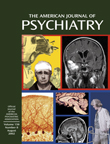Information Processing Deficits in Acutely Psychotic Schizophrenia Patients Medicated and Unmedicated at the Time of Admission
Abstract
OBJECTIVE: In patients with schizophrenia, information processing deficits, such as those reported in studies that measured prepulse inhibition of the human startle response and habituation of startle magnitude, may be improved with atypical antipsychotic treatment. However, it remains unclear whether antipsychotic medication is directly responsible for the improvement or whether differences in prepulse inhibition reflect other factors, such as acuity status. The present study investigated the effects of antipsychotics on prepulse inhibition and startle habituation in acutely hospitalized patients with schizophrenia. METHOD: Forty-one acutely psychotic schizophrenia patients (21 who were unmedicated at the time of admission and 20 who had been receiving antipsychotic treatment) were tested within 72 hours of hospital admission. Thirteen healthy subjects were also studied for comparative purposes. Primary dependent measures were startle responsivity, reactivity, prepulse inhibition, and startle habituation. RESULTS: Schizophrenia patients, whether medicated or unmedicated at admission, showed prepulse inhibition deficits compared with healthy subjects and did not statistically differ from each other in startle magnitude, prepulse inhibition, or habituation. There was a higher number of startle “nonresponders” among those who had been receiving medication versus those unmedicated at the time of admission. CONCLUSIONS: The present findings suggest that antipsychotic effects on prepulse inhibition may not be evident at a time when schizophrenia patients are acutely symptomatic. These results suggest that the neurobiological substrate underlying prepulse inhibition deficits may be dysregulated during acute psychotic states while the patients are in early phases of medication treatment.



